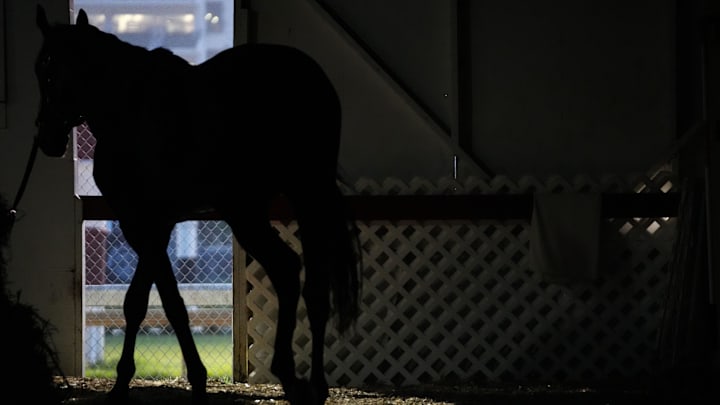Unthinkable Tragedy: Multiple Horses Euthanized After Positive EIA Results Confirmed

Absolutely heartbreaking news has hit the horse industry. Hall of Fame race horse trainer M. Heath Taylor confirmed that his barn has been infected with Equine Infection Anemia (EIA).
Horse owners across the country might recognize the Coggins test before knowing that it is EIA it is testing for. Unfortunately, nearly 100 percent of the time, a confirmed positive results in the animal being euthanized. Such is the case for these horses in California.
Taylor had horses in Albuquerque, New Mexico at the Downs at Albuquerque meet. The horses had all tested negative before they left and were moved to Los Alamitos, California.
The cause of the infection and the actual starting point has not yet been identified but is being fully investigated by the California Department of Food and Agriculture (CDFA).
Equine Infectious Anemia is a bloodborne disease that is highly contagious and transmitted usually by bites from infected flies. It can also be transferred in utero from pregnant mares to their foals. Stallions can infect mares during breeding and dirty needles used from horse to horse can also spread the disease.
Immediate response is always necessary if a test comes back positive as horses can be asymptomatic even while being infected. On the opposite end of the spectrum, horses can also exhibit and fever or die suddenly if infected with EIA.
On September 24, according to the Paulick Report, the California Horse Racing Board was notified on Septemer 24 that EIA had been identified in a Quarter Horse being housed at Los Alamitos.
Biosecurity measures were immediately put into place. The animal was quarantined. The standard course of action is to redo the test to confirm actual contamination and then there are only two options.
Given that EIA has no known treatment along with the fact that an infected horse is a very dangerous risk to other horses, there are only two options: lifetime quarantine or humane euthanasia.
While the second option is a very hard decision to make, legal and ethical considerations must be taken into account with the horses. The quarantined horse would have very strict regulations and could never be in contact with any other horses. Owners would be taking an extreme risk housing an EIA positive animal.
In nearly every case, officials will recommend euthanasia to keep the general population of horses safe.
In total, Taylor has lost seven horses that were in his care and exhibited positive EIA tests. He is obviously devastated and spoke with Stallionesearch.com about the situation.
"This is one the worst and hardest things I've encountered in my life, let alone my career," said Taylor. "Spanning 29 years of training in seventeen different states with over 10,000 starts, nothing like this has ever happened to me."
"Contrary to what has gotten around, this isn't just impacting one of my owners. Unfortunately, it is affecting many of my owners," said Taylor.
Taylor and everyone involved are willingly working closely with all of the state and federal agencies involved.
As stated above, the initial cause of the infection is unknown but Taylor has offered the knowledge that while in Ruidoso, his barn was flooded. It was the only barn that had standing water, contamination and even sewage up to animal's chests before they could be evacuated.
The flooding at Ruidoso occurred quickly and with very little notice as flash floods took over the area. A burn scar left from a wildfire added to the flash flood situation.
A heartbroken trainer explained, "This is such a sad and horrible time for us in my barns. All of the horses looked great, with no sign of illness or distress, looking as if they could all head to the paddock and compete in a race today. Instead, it was an unthinkable scene of watching grooms lead over horses, which have been their livelihoods, like mine, and to see those horses put down. It is just heartbreaking."
According to the American Association of Equine Practitioners, horse owners should exhibit excellent biosecurity measures at this time, and honestly always to prevent EIA from being spread.
